On November 3, 2021, the ISM’s Interdisciplinary Program in Music and the Black Church was officially launched at an event celebrating Black gospel song. In “Meditating on the Black Gospel Tradition” Professor Braxton D. Shelley held a panel conversation with Cheryl Townsend-Gilkes and Cornel West, interspersed with instrumental solos by esteemed gospel musicians. The event in Yale Divinity School’s Marquand Chapel also marked the publication of Professor Shelley’s book, Healing for the Soul: Richard Smallwood, the Vamp, and the Gospel Imagination. See the links below to view videos, photos and reflections from the event.
Music and the Black Church Program officially launched
Panelist Bios
Professor Braxton D. Shelley is a path-breaking theorist of African American sacred music, and the faculty director of the Interdisciplinary Program in Music and the Black Church at the Yale Institute of Sacred Music. He is a scholar, an ordained minister, and an experienced church musician.
A native of North Carolina, Professor Shelley graduated with highest distinction from Duke University where he majored in music and minored in history. He then entered the Ph.D. program in the History and Theory of Music at the University of Chicago. While finishing his Ph.D., he also earned a Master of Divinity degree at the University of Chicago Divinity School, upon which he was ordained in the Missionary Baptist church. In 2017, he was appointed assistant professor of music at Harvard University, where he taught until he was appointed at Yale..
Professor Shelley is one of the most celebrated musicologists of his generation. He was awarded the Paul A. Pisk Prize in 2016 by the American Musicological Society (AMS) for the best paper by a graduate student. In 2018, he won the Dean’s Distinguished Dissertation Award from the University of Chicago’s Division of the Humanities. His field-changing article “Analyzing Gospel,” which appeared in the Journal of the AMS, was awarded prizes from all three major American professional societies for music studies: the Einstein Award from the AMS, the Kunst Prize from the Society of Ethnomusicology, and the Adam Krims Award from the Popular Music Interest Group of the Society of Music Theory. Recognition from these three scholarly organizations illustrates the extraordinary interdisciplinary expertise Prof. Shelley brings to our campus.
Professor Shelley’s first book, Healing for the Soul: Richard Smallwood, the Vamp, and the Gospel Imagination, published by Oxford University Press was hailed by Professor Cornel West as “the best book written on Gospel Music” and that the “instant classic forever changes modern scholarship in contemporary music and Black cultural performance.” Professor Guthrie Ramsey of the University of Pennsylvania said, “This profound and illuminating book could only have been written by someone who’s spent years on the cultural frontline: in the pulpit, behind a Hammond B-3 organ, and immersed in the archives of gospel music’s history and lived experiences.”
His second book with the University of California Press, is entitled An Eternal Pitch: Bishop G.E. Patterson and the Afterlives of Ecstasy. It analyzes the great preacher’s musical style, his use of radio and other media, and the digital reverberation of his ministry after his death in 2007.
Professor Shelley has nearly a dozen articles and book chapters in press or published. He is also a frequent guest lecturer and clinician.
Cheryl Townsend-Gilkes is a sociologist, womanist scholar, professor, and ordained Baptist minister. Currently the John D. and Catherine T. MacArthur Professor of African-American Studies and Sociology and director of the African American Studies Program at Colby College, she holds degrees in sociology from Northeastern University (B.A.,M.A., Ph.D.), has pursued graduate theological studies at Boston University’s School of Theology, and is the recipient of an honorary Doctor of Divinity degree from Ursinus College in Pennsylvania. Several of her journal articles have been reprinted in anthologies such as African American Religious Thought: An Anthology, edited by Cornel West and Eddie Glaude, and Kenneth Aman’s The Border Regions of Faith. Her 2010 essay, “Still the Most Segregated Hour: Religion, Race, and the American Experience” is featured in Patricia Hill Collins and John Solomos’ Handbook on Race and Ethnicity.
Cornel West is a philosopher, public intellectual, political activist, and social critic. The grandson of a Baptist minister, he draws intellectual contributions from Christianity, the Black church, Marxism, neo-pragmatism, and transcendentalism. He has held professorships and fellowships at Harvard University, Yale University, Union Theological Seminary, Princeton University, Dartmouth College, Pepperdine University, and the University of Paris. A socialist, West has focused on the roles of race, gender, and class in American society, and the means by which individuals act (and react) to their “radical conditionedness”. He is the recipient of over 20 honorary degrees and an American Book Award, and has written or contributed to over twenty published books. Among his most influential books are Race Matters (1994) and Democracy Matters (2004).
Reflections on the Event
Allowing Suffering to Speak: Black Gospel’s Transfiguration of Sorrow into Song
During the program’s inaugural event, one of our special guests, Professor Cornel West, spoke at length about the origins and meanings of the Black gospel tradition. Over and over again, Professor West used words like “cultivate” and “transfigure” to describe the relationship between the power of Black sacred music and the centuries of struggle from which this tradition arises. West recalled that this music descends from the “guttural cries and wrenching moans and visceral groans of our brothers and sisters in those slave ships.” As he tuned into the resonance of those who labored on plantations, as well as that of “share croppers and tenant farmers and inhabitants of the ghettoes and the hoods,” Professor West argued that Black gospel, in both form and content, is a method of conveying truth. This insistence echoes the pioneering liberation theologian James Cone’s assertion that “the truth of black religion is not limited to the literal meaning of the words. Truth is also disclosed in the movement of the language and the passion created when a song is sung in the right pitch and tonal quality. Truth is found in shout, hum, and moan as these expressions move the people closer to the source of their being” (God of the Oppressed 1975, 21).
As Professor West powerfully argued that night, the condition of truth is allowing suffering to speak. Instead of entertainment, and working against mere “stimulation and titillation,” Black gospel reaches its audiences with depth, profundity, ethics, and love. Armed with this context, it was clear to those in Marquand–and to the many who watched online–that the extraordinary musical skill of Wolfock, Jackson, Hill, and Davis indexes not only individual creativity, but also each individual’s recognition of their place within a tradition that transcends generations. Even though COVID-19 made it impossible to sing in any conventional sense, each instrumentalist sang in a different way. Every note they played forged a deeper connection between their audiences and the work song, the spiritual, the hymn, the gospel song, and the numerous other streams of Black sacred music.
Given the evening’s special status as the inaugural event of the Program in Music and the Black Church, Professor West’s argument was, in a sense, the first “word about the tradition.” The wisdom he shared teaches that the sacred is always political, and that the politics of this tradition are intimately associated with the pursuit of freedom and justice. These politics take sonic form in the full range of performances whose combination of beauty and passion, joy and the evidence of suffering, yield a distinctive kind of affect, intensity, and power.
After Devotion
Braxton D. Shelley
In my teaching and scholarship on the Black gospel tradition, I routinely make reference to the philosopher Michel Foucault’s notion of “heterotopia” in order to describe the ways that many sanctuaries become profoundly perplexing spaces—physical locales in which a congregation can be located in the twenty-first century while standing at the foot of the cross, struggling to cross the Red Sea while soothing themselves with a balm in Gilead. On Wednesday November 3, the Divinity School’s Marquand Chapel became one of those spaces. As we talked and listened, sometimes sitting and sometimes standing, centuries’ worth of musical memory and time-stained scriptural tradition found new life on the campus of Yale University with the launch of the new Interdisciplinary Program in Music and the Black Church. This new program’s aim between Yale, the ISM, and its local and national communities was evident from the roster of participants. From Houston and Memphis, from Chicago and Newark, from New York City and Waterville, Maine, musicians and panelists came to New Haven. Drawing together those who reflect and those who practice, those who teach and those who learn, this event, like the program it launches, sought to explore the boundaries between each of the aforementioned categories.
What a time! What a celebration, an event that was, in many ways, about time itself. When I first conceived of this launch event, an event that would bring together scholars and practitioners, students and faculty, the notion of devotion came rather forcefully into my mind. Devotion: before and after. Devotion: the moment before the official start of many Black Baptist church services and the force that sustains this practice from Sunday to Sunday. Devotion is synonymous with Black gospel, a tradition preoccupied with scenes and settings that somehow become present during the performance of a song or sermon. Devotion: both a period of preparation and a promise to persist. Persistence is what I heard when Joey Woolfalk played Richard Smallwood’s “I Love The Lord (He Heard My Cry)” on the guitar. As he made his guitar cry, I could see this fragment from Psalm 116 travel into Dr. Isaac Watts’ aural repertory, morphing into a treasured Black expression of hymn lining, one of the musical traditions that shaped the gospel imagination of a young Richard Smallwood. Given the mechanics of this practice, it is quite likely that it was during the ritual called devotion that Smallwood first heard this hymn. Thus, is it quite fitting that this is where Devotion began.
Even before the beginning of that Wednesday evening program, profound things were already afoot. While dozens of people gathered in Marquand on Wednesday, for the 11:30 am chapel service and for the 7:45 event, a few folks assembled on Tuesday evening, evoking a scene that gave new meaning to these words of Jesus: “Where two or three are gathered in my name, there am I in the midst.” That night, as the musicians Pamela Jean Davis, Melanie Hill, Derrick Jackson, and Joey Woolfalk prepared for the main event, a few students gradually and organically made their way into that space. What was to be a kind of rehearsal became its own event: as these musicians played and these students—safely clad in their masks—sang the “songs of Zion,” something happened: the Fire fell. This emergent musical gathering became a site of worship—an experience of presence. Surely presence—the presence of musical genius, the presence of divine power, the presence of diverse community—showed up in Marquand. Even more, the event offered many of those who routinely inhabit the spaces of this University and its Divinity School an opportunity to find the indispensability of their presence affirmed in an official, deeply meaningful, and deeply personal way.
In Marquand, the clouds parted, the sky opened, and the kind of intense, liminal, and ecstatic so often elicited by the music of the Black church found a home on this campus. As students and guests used their bodies to acknowledge another world’s presence, the significance of the ISM’s new program came into view. More than the virtuosity or intellectual sophistication that the program will lift up, community itself, the kind that the Black church has long exemplified, the kind of sincere collectivity that is practiced through sound, will be our chief aim. This, too, is devotion.
I leave this inaugural series of events more convinced than ever that, through the ISM’s Interdisciplinary Program in Music and the Black Church, we have the opportunity to build an institutional home for one of the most generative traditions of American music. In so doing, we will make new space for many of the students already on this campus and for many of those yet unborn to feel a different kind of home on this campus.
In Retrospect: A Student’s View
Terrance McQueen (M.Div. ’24)
While some time has passed since the ISM and Dr. Braxton Shelley launched Devotion: Meditating on the Black Gospel Tradition, I still find myself without words which to fully encapsulate what transpired during this event. As a product of the Black church and a Black church musician, I was reminded of home. During the event, I was able to recall the sounds and songs of my grandparents’ church. Every instrument told a story. Dr. Melanie Hill’s rendition of For Every Mountain on violin, Pamela Jean Davis’s world-renowned Order My Steps on piano, and Derrick Jackson’s soul-stirring I Don’t Feel No Ways Tired on the Hammond organ captured the experience of the Black gospel music tradition. I cannot forget the phenomenal bassist, guitarist, and drummer who also contributed to the stories being told through the sounds of Black gospel music. This was no ordinary launch or celebration, but it was a moment to reflect and meditate on how African Americans endured hardship without losing their sound. Devotion: Meditating on the Black Gospel Tradition was a celebration of the sounds that carried my ancestors through slavery. The sound of Black gospel music is a sound of hope, resilience, and strength to continue fighting for better days.
It can be argued that the Black gospel music tradition is not universal and solely belongs to those of the African American experience, but Devotion showcased a counterargument to that belief. In the Black church, congregants respond with a waving of a hand, a vocal shout, or simply standing with a distinct face of satisfaction. While the response to gospel music varies across the diaspora, something beautiful manifested for many attendees that filled Marquand Chapel that evening. A diverse crowd that was representative of different cultures and faith practices came together to experience an electrifying evening. For the many attendees unfamiliar with the Black cultural response to music, there was an unspoken response where these attendees were also moved to wave their hand, stand in awe, or simply sit in amazement from the sounds of the Black church. Devotion illustrated what will take place as the ISM carries out its Interdiscplinary Program on Music and the Black Church — a space where folks of many cultural backgrounds and musical expertise will learn the rich history of Black gospel music.
Martin Jean
November’s launch of the ISM’s interdisciplinary Program in Music and the Black Church was the culmination of a longstanding dream and planning phase. I am grateful to Terrance McQueen for his reflection on it, and doubly grateful to Prof. Braxton Shelley for curating and leading it.
For my part, it represented the best of what the ISM was founded to do. We were honored to spend a life-changing evening with some of the leading Gospel instrumentalists of the age, as well as scholars who have devoted their life to understanding, interpreting, and preserving the meaning of this immense body of work. Dr. Cornel West claims that Gospel music is America’s greatest musical gift to the world. We heard evidence of this on November 3.
Marquand was at COVID capacity that evening, and we were joined then and through later viewing by thousands of others who have shared their own thanks for these great gifts. But these thought leaders have made us aware that we were joined by still more – by the people, living and dead, whose life experiences shaped, nurtured, and transmitted this music through the generations. We worshiped that evening with saints and angels and the whole company of heaven, and my heart was overflowing with thanks for this feast of music and prayer.
This event is truly a beginning of a new chapter in ISM’s history. Music and the Black Church is a multi-pronged program that will bring classes, sounds, and practices to Yale through scholars, musicians, and church leaders. It will nurture not only Yale students, but prepare people for ministry in parishes and for leadership in the academy and society. As soon as COVID protocols allow, you will soon be reading about events to engage clergy and church musicians as well as seminars to gather young scholars who are at the beginning of their explorations of these riches. I look forward to learning alongside so many others as we walk down the path together.
Professor West’s impassioned articulation of the Black gospel tradition
During the program’s inaugural event in November 2021, Dr. Cornel West, the Dietrich Bonhoeffer Chair at Union Theological Seminary, spoke at length about the power of Black sacred music and the centuries of struggle from which this tradition arises.
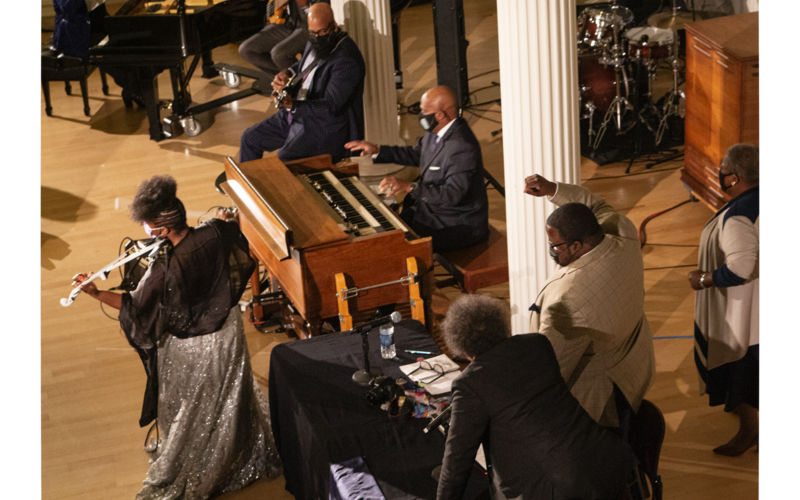
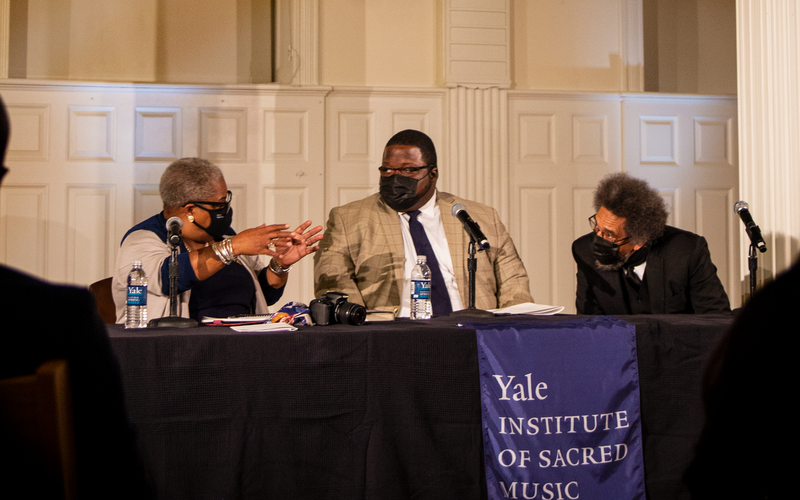
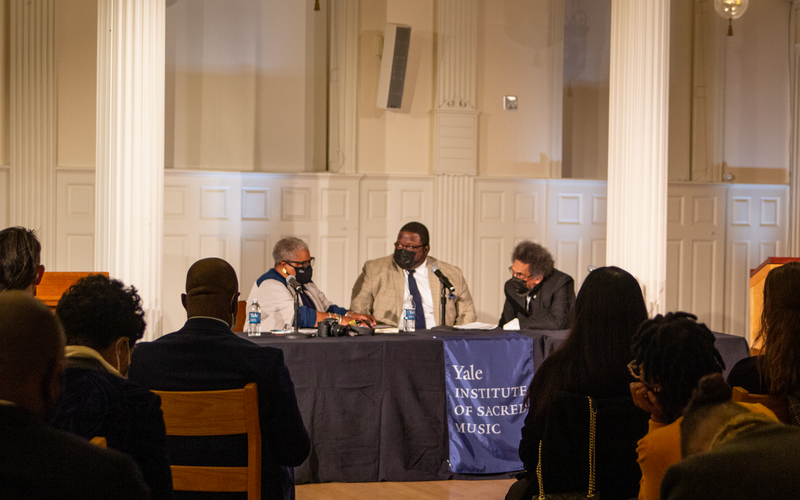
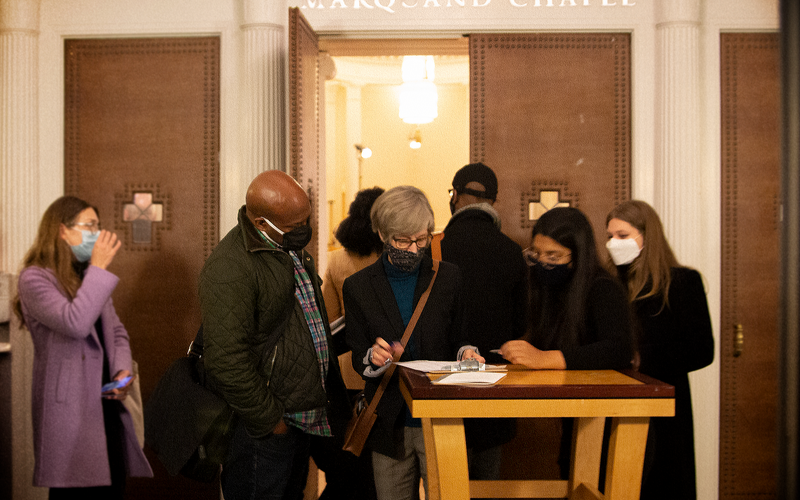
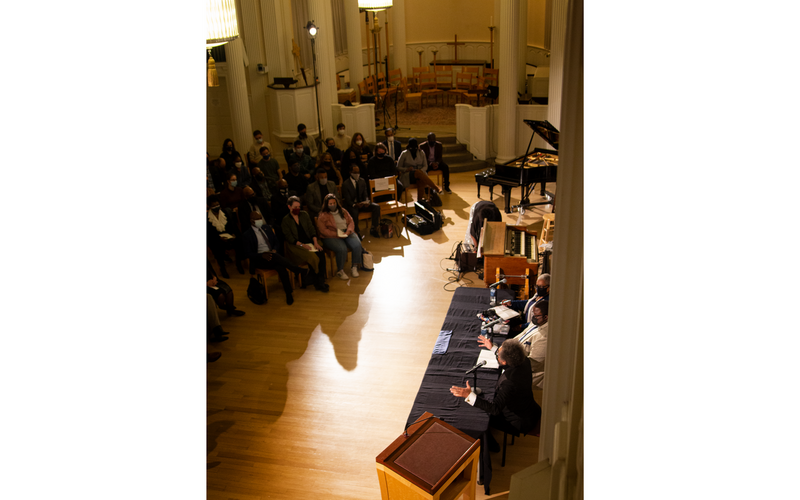
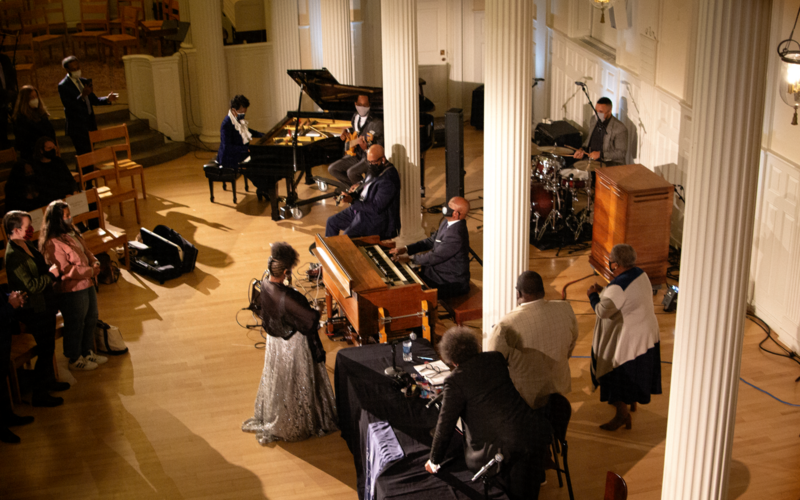
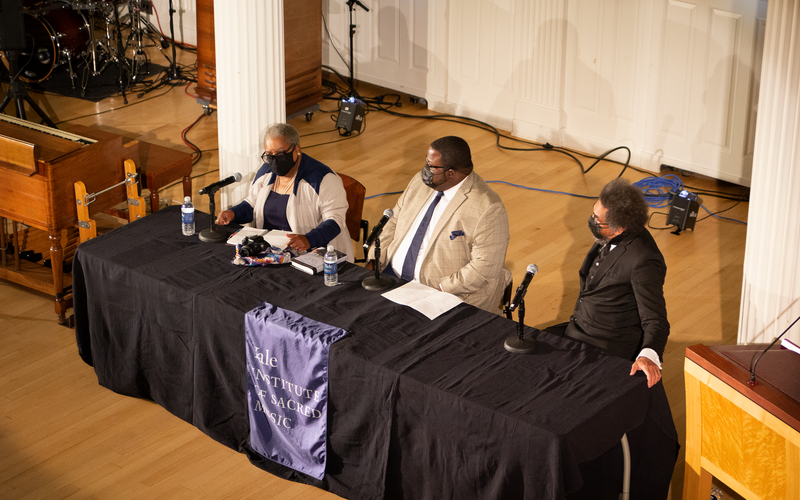
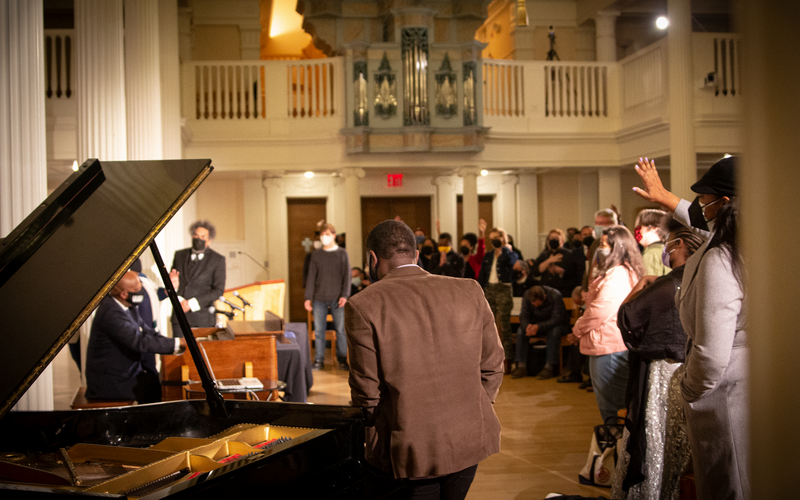
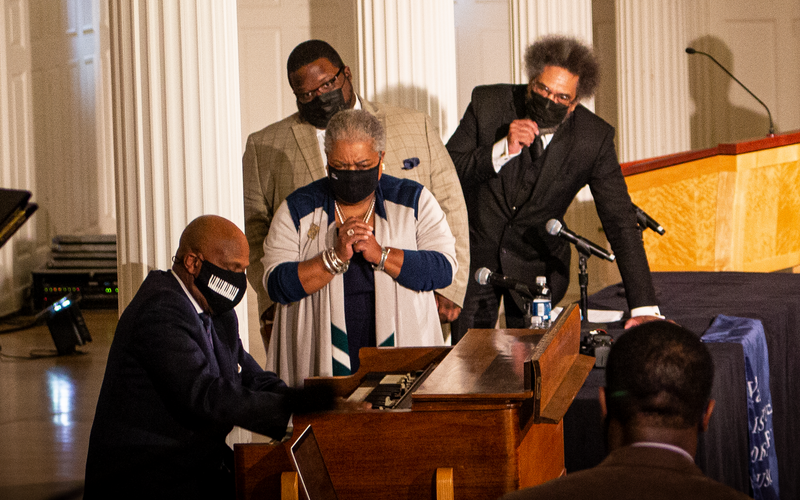
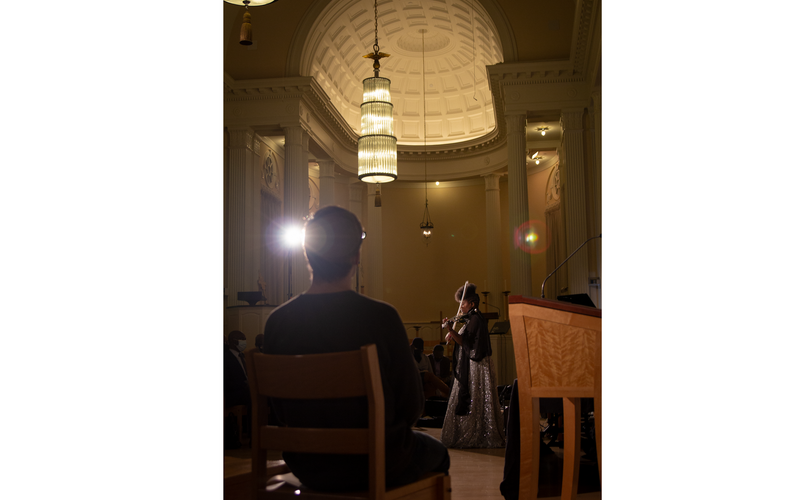
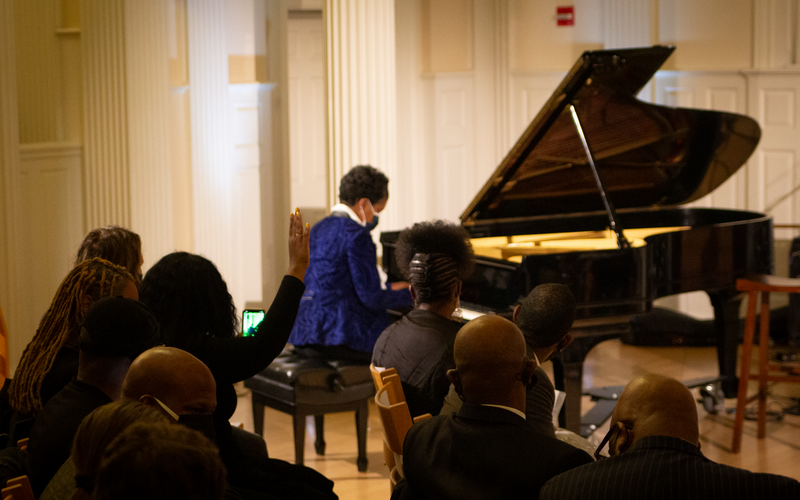
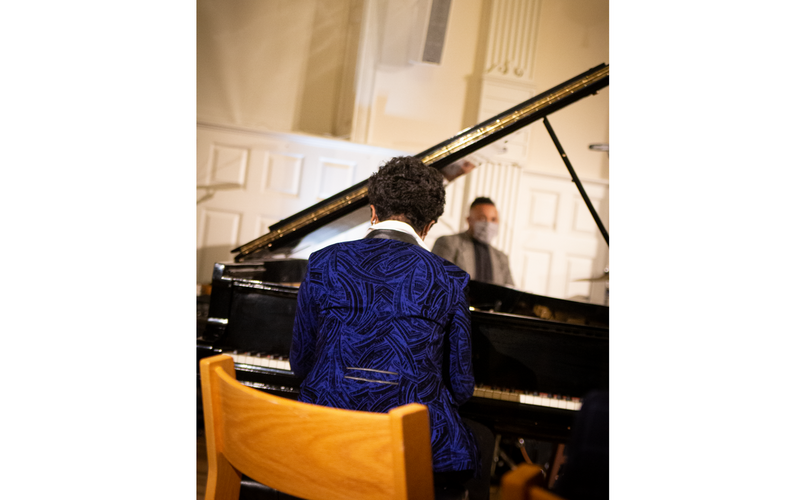


The panelists jam to the music
Cheryl Townsend-Gilkes, Braxton Shelley, and Cornel West
Cheryl Townsend-Gilkes, Braxton Shelley, and Cornel West
The live crowd checks into Marquand Chapel
Aerial shot of Cornel West and panel speaking
Aerial view of the performance
Cheryl Townsend-Gilkes, Braxton Shelley, Cornel West
Derrick Jackson plays organ before Cornel West, Nathaniel Gumbs, lively crowd
Derrick Jackson plays organ for the captivated panelists
Dr. Melanie Hill performs a violin solo
Pamela Jean Davis performs a piano piece
Pamela Jean Davis plays the piano
The live crowd checks into Marquand Chapel.
The panelists jam to the music